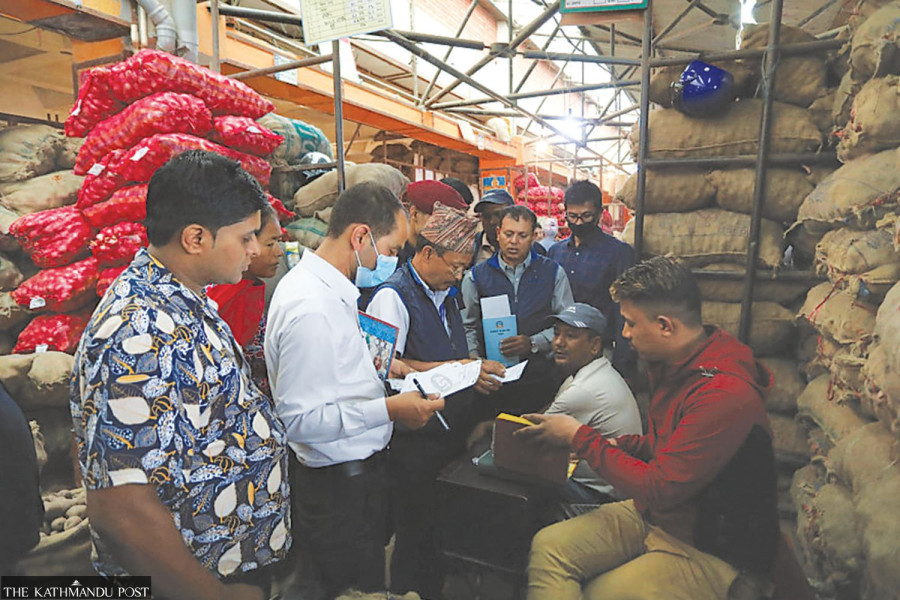Money
Festive season begins amid poor market monitoring
With ministries inactive, police units destroyed, and oversight mechanisms weakened after the Gen Z uprising,opportunist traders are exploiting the festive season to hike prices and sell substandard goods.
Post Report
The festive season is already here, but market inspection has not been a government priority amid a heightened possibility of consumers being cheated.
Despite normal supply, some opportunist traders have been taking advantage of the poor market monitoring to increase prices on various pretexts, consumer rights activists said.
This is because of the relevant minister not being appointed and the police administration left dysfunctional by youth protests last week. Most of the police stations and patrol vehicles have been torched across the country.
The Gen Z movement ousted the KP Sharma Oli administration last week and an interim government is in place to hold elections in the next six months.
Economic activity in Nepal typically sees a significant uptick in the September-October period, with major festivals like Dashain and Tihar celebrated across communities. An estimated 40 percent of annual market activity takes place during Dashain, Tihar, and Chhath, according to economists.
“All the government mechanisms are in a chaotic state and have not been able to perform in a full-fledged manner. So the market inspection does not seem effective this year,” said Bishnu Prasad Timilsina, general secretary of the Forum for Protection of Consumer Rights-Nepal.
The Ministry of Industry, Commerce and Supplies, which looks after supplies, is not active. There is no chief at the Kathmandu District Administration Office; many municipal and local government offices across the country have been vandalised and set on fire. These increase the chances of market anomalies, Timilsina said.
However, the Department of Commerce, Supplies and Consumer Protection said they have formed a festive-targeted market inspection, and they plan to add more teams to make it effective.
Dik Bahadur Karki, director at the Department of Commerce, Supplies and Consumer Protection, said that the market inspection was discontinued for a few days due to vandalism. From Tuesday, the department has deployed six teams for market inspection in the Valley and is preparing to deploy another team.
As consumption increases during the festive time, the department conducts market inspection on the basis of complaints that it receives online and via phone calls besides regular monitoring.
“If we receive any complaint of artificial shortage of goods and hike in prices, we will immediately address it,” Karki said.
The arrival of the festivals means an increase in consumption of food and non-food items by almost twofold, and the jump in turnover raises the possibility of unscrupulous activities.
Being a trade-based economy, Nepal is dependent on food and non-food items imported from other countries. The lack of inspection on imported goods by big traders has been increasing cases of relabelling that directly impact human health, consumer rights activists say.
For instance, the packet of bhai masala (a mixture of dry fruits and chocolates) given by a sister to her brothers at Tihar often contains dry fruits that are of no quality and inedible. The package looks good, but when it is opened, there is no quality.
Not only food items, but people leaving Kathmandu Valley to celebrate festivals in their hometowns also are cheated on fares while travelling by road or air.
This year, transport entrepreneurs did not open advance booking a month before Dashain, and consumer rights activists say that this troubles customers trying to get a ticket. And even if they get one, it may be highly charged.
Flights also charge the upper fare limit when demand is high, which compels passengers to pay inflated fares despite full passenger capacity.
Traders or business entrepreneurs, most of them look to make profits year round during festivals, hurting consumers every time.
Nepal’s open border with the southern neighbour allows expired food and non-food items to enter through illegal channels. The government has brought into operation fair price shops but their effectiveness in easing trade is limited, said rights activists.
The Salt Trading Corporation is operating 40 fair-priced shops and the Food Management and Trading Company runs 111 such outlets across the country. However, even in the Kathmandu valley, they are located in the city’s core, not in easily accessible areas, Timilsina said.
Even if someone reaches those shops, they only get a Rs2 discount on salt and a Rs5 discount on sugar per kilo.
Those fair-priced shops open only during office hours—from 10 am to 5 pm, while consumers generally shop in the morning and evening. So there is no effectiveness, he said.
Dhurba Kumar Kafle, assistant spokesperson for the Kathmandu Metropolitan City, said it has been collecting samples of food items for tests.
“We will go for a field inspection from Monday, if we find any problem in the tested samples, in joint coordination with the Department of Food Technology and Quality Control,” he said. The municipal authority will use the mobile lab testing vehicle of the department.
Most distributors and wholesalers are coming by themselves to test the labelling and packaging of the goods in the metropolitan office, he said.
Market inspection is often intensified ahead of the Dashain-Tihar-Chhath festival season to curb malicious trading practices when demand is high.
The metropolis will be monitoring the sale of most widely consumed food items during festivals, such as meat and meat products, vegetables and fruits, sweets, and dry fruits.




 16.12°C Kathmandu
16.12°C Kathmandu












